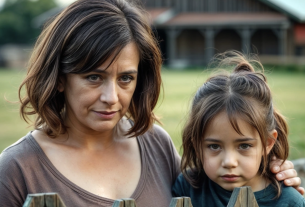Marina had always been proud of her career. A good position, a high salary, the respect of her colleagues—she had earned all of it through hard work. At forty-two, she confidently headed the marketing department at a large company. People considered her a successful woman. At least, that’s what they said to her face.
Her personal life turned out differently. The marriage had fallen apart ten years ago, and she hadn’t had time to have children. Home greeted her with a silence she had learned to appreciate. Her relatives, however, had their own opinion about that.
“Poor little Marina, all alone,” Aunt Vera lamented every time they met. “Work is fine, of course, but who’s going to bring you a glass of water in old age?”
Marina only smiled in response. Arguing was pointless.
Once a year she went back to her hometown for her mother’s birthday. Tiny Zelenogorsk welcomed her with familiar streets and the scent of lilacs. Family gatherings were always noisy. Two brothers with their wives and kids, aunts, uncles, cousins—everyone would crowd around the big table.
Marina never came empty-handed. Expensive gifts for her mother, treats for the table, clothes for the nieces and nephews. When her brother Sergei lost his job two years ago, she helped him with money. Aunt Vera got a voucher to a health resort from her.
This year Marina was bringing a special gift. Her nephew Kirill, the son of her middle brother Andrei, had gotten into a university in the capital. The tuition wasn’t free, and Andrei was having trouble with his business. Marina had prepared an envelope of cash—enough to cover the entire first year.
One meeting got canceled this time. And Marina reached Zelenogorsk late in the evening, the day before her mother’s jubilee. Deciding to make it a surprise, she didn’t call ahead. Let it be an unexpected joy!
After parking the car around the corner, Marina walked lightly down the street she’d known since childhood. Twilight wrapped the quiet town; warm lights were coming on in the windows. She pictured her mother’s delight at seeing her on the doorstep.
Her parents’ house glowed from every window. Voices drifted out through the open veranda. The family was gathered for dinner. Marina smiled and quickened her pace. Already at the gate, she slowed and listened when she heard her name.
“Marina will bring another pile of useless gifts,” Andrei’s voice sounded. “She thinks her money solves every problem.”
Marina’s hand froze on the latch. She stood motionless by the fence, afraid to move.
“Tomorrow she’ll brag about her successes,” her sister-in-law Olga chimed in. “And look down on us. A big city lady!”
Marina flinched. She shifted awkwardly from foot to foot, not knowing what to do, her brows knitting as she tried to steady her racing heart.
“Successful and unhappy,” Aunt Vera added in her usual tone of pity. “She has money, but no joy. A career instead of a family—how can that be happiness for a woman?”
A cold wind cut through Marina to the bone, though the evening was warm. She clutched her bag tighter, not daring to stir and give herself away.
“What do you expect from an ‘old maid with a heart of stone’?” came Aunt Klava’s creaking voice. “She’s got a calculator instead of a soul.”
Marina raised her eyes to the sky. Aunt Klava had never liked her, convinced her niece had gotten too full of herself. For many years Marina had let such barbs pass by, but today every word hit the mark.
“Did you see how she looked at our renovation last time?” Andrei chimed in, his cup clinking. “That look—as if to say, ‘poor relations, how do you even live like this?’ She flaunts her achievements, and we’re supposed to be the losers.”
“Don’t exaggerate, Andrei,” their mother tried to object.
“Oh, come on, Mom, you know it’s true,” Andrei wouldn’t stop. “She shows up once a year, brings presents, and condescends to our modest life.”
Marina bit her lip. Had they always thought of her that way? She leaned against the fence. Her knees were buckling.
“Marishka is unhappy in her own way,” her mother sighed softly. “She’s got a career and money, but she lacks the main thing—family, children. There’s no love.”
Those words cut deepest of all. Her mother was the one person whose opinion Marina truly valued. And even she thought her life was empty.
“She doesn’t have anywhere to put her money anyway,” came the voice of her other brother, Viktor. “So let her at least help her nephew with school. She’s not a stranger to him.”
Marina drew a long breath, fighting back tears. She had always felt closer to Viktor than to the others. As kids they’d built forts together, dreamed of traveling.
“She promised to help with Kirill’s tuition,” Andrei began, in a tone like he was discussing a business deal. “We just have to nudge her gently into the conversation—maybe she’ll give a bigger amount.”
A ripple of laughter ran along the veranda. Marina clenched her fists until her nails dug into her palms. So all those calls, all those questions about her life, the invitations to come early—were all just about the money?
“An unmotherly career woman just blows her cash on fancy clothes anyway,” Aunt Klava said with obvious relish. “Let her at least be of some use to the family.”
Hot tears rolled down Marina’s cheeks. For twenty years she had believed she was maintaining warm relations with her kin. She had been proud she could help her loved ones. She rejoiced when the nieces and nephews called to wish her a happy birthday. She wiped their childish tears, sent packages for the holidays, remembered every important date.
And they saw only a wallet when they looked at her.
Marina decisively wiped away her tears. She straightened her shoulders. She yanked the gate latch, which swung open with a loud creak. She stepped into the yard, setting off a real panic on the veranda.
Her relatives froze, faces stricken. Her mother pressed a hand to her mouth. Aunt Klava turned pale. In Andrei’s hands Marina noticed a cup she herself had brought last time—fine Chinese porcelain. Useless gifts, were they? Indeed.
“Marinochka, you’re already here?” her mother stammered, trying to defuse the moment.
In the sudden silence, the chirping of crickets was clearly audible. Marina looked around at everyone gathered. Familiar faces suddenly seemed foreign and hostile.
“Behind my back you insult me, and then you ask me for money?” she said evenly, gripping her bag of gifts and the envelope even tighter.
The veranda plunged into a deafening hush. Faces froze in various expressions—from fear to shame. Andrei was the first to recover and gave a nervous chuckle.
“Oh come on, Marina, we were just talking. It was all jokes—you misunderstood,” Andrei set his cup down and stood, taking a step toward his sister.
Marina raised a hand to stop him. He halted.
“Don’t. I heard enough.” She walked slowly to the table without taking the bag off her shoulder. “You know, all these years I thought of you as family. A real family.”
“Marinochka, dear…” her mother half-rose, reaching out a hand.
“No, Mom, let me finish,” Marina swept them all with an icy gaze. “I denied myself so much in order to help you. When Dad got sick, I paid for his treatment myself. When Viktor’s roof burned down, I took out a loan I paid off over three years. Your medications, Mom. The repairs on this house. Your first car, Andrei. And you… you don’t even consider me a person.”
Her mother blanched and sank back into her chair. Aunt Klava stared into her plate as if she’d found something very interesting there. Viktor drummed his fingers on the table, tense.
“Marin, why are you like this?” he finally looked up. “It was just a bad joke. We love you, really. We were just chatting.”
“Chatting?” Marina let out a bitter laugh. “‘Old maid with a heart of stone.’ ‘Childless careerist.’ ‘Nowhere to put her money.’ That’s your love, is it?”
Andrei continued to study the floor, not lifting his head.
Drawn by the commotion, nephew Kirill stepped out onto the veranda. A tall, skinny boy, he froze in the doorway, staring at the adults in confusion.
“Aunt Marina?” he took an uncertain step forward. “You’re already here?”
For a moment, Marina softened at the sight of him. He was the very reason she had prepared the envelope of money. But then she remembered Andrei’s words about how to “gently lead her into the conversation” and “have her give a bigger amount.”
“Yes, Kirill. I arrived—and I’m already leaving,” she took a small box from her bag, neatly wrapped in bright paper. “This is for you, Mom. Happy birthday.”
Marina set a scarf on the table, bought long before she overheard their conversation. She had wanted to please her mother, had pictured her smile. Now the gift felt pathetic and unnecessary.
“And this,” she patted the bag where the envelope lay, “I’m taking with me. The ‘old maid with a heart of stone’ will no longer be a source of financial support for those who can’t manage basic respect.”
“Marina, please, stay,” her mother stood and held out a hand. “Let’s talk calmly.”
“We’ve been talking for fifteen years, Mom. I only heard the truth just now.” Marina turned and headed for the gate with quick steps.
“Marina! Wait!” Andrei jumped up. “I’m sorry, we got carried away! Stay!”
She didn’t look back, despite the shouts and pleas. Kirill ran after her, catching up at the gate.
“Aunt Marina, please wait!” he looked genuinely upset. “I don’t know what happened, but they didn’t mean to hurt you, really!”
Marina only shook her head. She took her nephew by the shoulders and kissed his forehead briefly.
“Study well, Kirill. And be better than they are.” She let him go and got into the car.
On the way home, Marina mechanically deleted her relatives’ contacts from her phone. One after another. Mom. Andrei. Viktor. Aunt Klava. She lingered the longest over Kirill’s avatar, but in the end deleted him too.
In the weeks that followed, letters of apology arrived. Andrei called from different numbers, trying to get through. Her mother left tearful voice messages. But Marina remained adamant. She changed her phone number. She changed her email address.
At work she threw herself into a new project. She used her vacation to travel to Poland. Then Italy, Portugal, New Zealand. Countries she had been putting off “for later” while helping her family.
With time, the pain dulled. Sometimes, looking through old photos, Marina felt a pang of regret. But her decision to cut off contact with her kin remained unchanged. She finally understood an important lesson: sometimes breaking off toxic ties is the only path to genuine freedom and self-respect.
And it turned out to be the best gift she could give herself.



